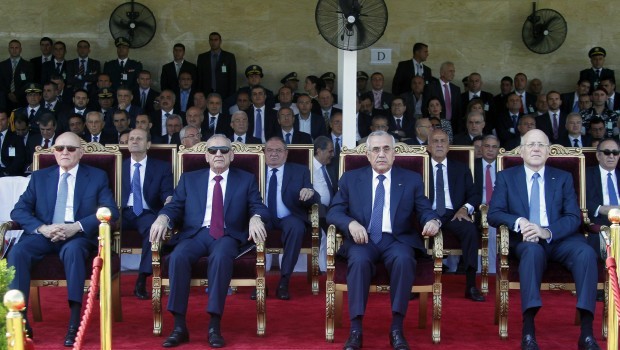Just as the snow atop Mount Hermon is absent due to natural factors and global warming, there are many factors that have transformed the dark political positions in Lebanon to bright whites at a time of regional upheaval. Politically, the security sector’s involvement in the presidential elections has muddied the waters. Further complicating matters was Hezbollah’s urgent need for Sunni cover, represented by the Future Movement. Hezbollah, which is up to its neck in “Syrian hell,” only came to this conclusion after it decided that fabricating an alternative Sunni leadership would not and will not bear fruit.
Returning to the root of the problem, we find that it began in 2011 with the Black Coup by Hezbollah against the Doha Agreement. That was the day Prime Minister Saad Al-Hariri was expected to meet with US President Barack Obama. This estranged Hariri from his Christian ally Michel Aoun, who famously advised Hariri to buy a one-way ticket out of Lebanon. Unfortunately for Hezbollah, this also coincided with the start of the nascent Syrian protest movement demanding the departure of Assad.
This movement, which began peacefully, soon militarized, with the Assad regime’s highly effective demonization of the revolution and accusations of apostasy. Stoking sectarianism soon turned on the Iranian–Lebanese alliance and prevented it from achieving its objectives: dominating the Sunni bloc, and striking a balance based on mutual respect of the representation of sects within the Lebanese government and parliament.
The reasons for Hariri’s exile from the Lebanese political scene were made clear by the assassinations of the President of the Information Branch Maj. Gen. Wissam Al-Hassan and former Minister Mohamad Chatah. Hezbollah’s involvement in the war in support of the Assad regime, which kills its own people with chemicals and explosives, has awakened what has come to be known as “the anti-jihad movement,” which has struck deep inside Hezbollah communities and abducted dozens of innocent people. This development confused Hezbollah, which pays hundreds of fighters to defend the Syrian regime and whose people can no longer tolerate the stresses of battle. Strikes from all sides have increased, security scares have become more frequent, and the economy teeters on the brink due to the insecurity felt by the majority of its people, who live well below what is commonly thought to be the middle class. From here began a radical shift. In a speech given by the Hezbollah secretary general, he announced the party’s acceptance of the government, a marked shift from previous statements declaring its firm opposition, especially regarding veto power.
Saad Al-Hariri’s return is an attempt to capitalize on Hezbollah’s failure: not quite a plane ride back to Beirut so much as an attempt to instill moderation in order to stop the creeping expansion of the Iranian agenda in the region. This agenda stokes the extremism embodied within some strands of Political Islam. On the one hand, it advances behind a façade of Islam; on the other, it works to create an alliance that penetrates the Arab hinterland, the foundation of which is Sunni extremism. It is an agenda of violence that makes no distinction between its kin and strangers. The allied Shi’ite extremism is cloaked in regional garb but is in fact led by Iran. But there is also a return of the moderation model of the Arab Spring, some of whose seeds were sewn in the heart of Beirut.
Al-Hariri’s return to the heart of the political equation is the product of a clear strategy led by Saudi Arabia in Egypt. Saudi Arabia cut off the road to an alliance between Iran and actors within political Islam: in Egypt, where it supports the Egyptian nationalist project; in Syria, where it made moves to prevent Iran from achieving its goal of maintaining the regime; and in Lebanon, where it seeks to re-correct the coup after those responsible for it became bogged down, both in Syria and Lebanon.
Based on the principle, “If you want to know what is happening in Lebanon, you have to know what is happening in the Arab world,” cultivating better understanding might return things back to normal. Moderation returns now to exercise its role. The coalition government’s rise to power is linked to Hezbollah’s disorientation and confusion.
It is not a coincidence that Hezbollah agreed to hand over the Justice and Security portfolios to ministers belonging to the Future Movement. It denotes an acceptance of the clear implications surrounding the need for Sunni moderation in the face of extremism. Hezbollah has an unrivaled ability to achieve such moderation by reducing its accusations of apostasy, upon which it relied heavily during the coup. It failed except in its attempt to deceive the Lebanese people.
It is also not a coincidence that Hezbollah handed over the Ministry of National Defense to a minister affiliated with President Michel Suleiman’s team, who gracefully facilitated communication with Saudi Arabia in order to secure the financial support and resources required to arm the Lebanese army to face a variety of terror threats.
So everything returned to normal in anticipation of the ministerial statement. The statement will be a test that will determine whether the government will be worthy of honor or scorn.
So the question remains: Do we, three months before the election of the president of the Republic, have an actual government, or is it merely a de facto interim government, resulting from the inability of any of the parties to win the election? Or is it a re-election of President Michel Suleiman who, on the one hand, artfully contained internal differences and a potential fallout during a delicate and hard time, while on the other, practiced flexible diplomacy that enabled communication with major regional and international powers? Were the Baabda Declaration and Bkerké Document merely gestures? And was too the government?
The counterpoint to this piece can be read here
